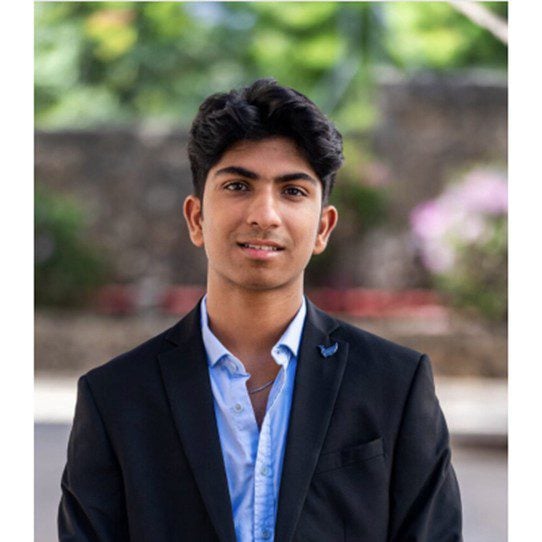An Indian Student’s Journey to Pursue a Master's in Molecular and Cellular Biology at LMU Munich: Affordable Education in the Heart of Europe
Summary:
University: Ludwig Maximilian University of Munich (LMU)
Degree: Master’s in Molecular and Cellular Biology (currently in 2nd year)
Previous Education: Bachelor’s in Biotechnology (GPA of ~8/10)
Tuition: Free (85 Euros semester contribution)

The Journey
My name is Sumith, I come from India, and I am pursuing a Master's degree in Molecular and Cellular Biology at the Ludwig Maximilian University of Munich (LMU) currently in my 2nd year of studies.
There is an increasing burden of diseases in our population, mostly due to carcinogen exposure, dietary habits, and other factors. I was curious about what goes on during these disorders. Working in a lab also made me ecstatic. Hence, I decided to pursue this field as it would open doors to many aspects of biological research.
Educational Background
I did my bachelor’s degree in biotechnology at one of the universities in India. Biotechnology is a vast field. I knew I wanted to be a scientist, but I didn’t know what kind of science I wanted to pursue. And so to say my bachelor’s degree helped me shape and polarize my interests would be a fair statement, since it gave me a taste of different kinds of science.
I had a GPA of ~8 (highest= 10) during my bachelors. However, GPA is not something that is of utmost importance because the master’s program has an entrance test. Most of the contents of the entrance exam were covered during the course of my bachelor’s degree.
How Did You Prepare to Apply for the Ludwig Maximilian University of Munich?
I started by drafting the motivation letter for the first round of the application process. I tried to keep it as simple as possible, covering 3 aspects: 1) My research/educational background 2) My future interests, and 3) the reason to join LMU and this course and how it would help you achieve your goals.
After this, I tried to gather all my other documents, including transcripts and language proficiency scores. German language proficiency was not required for this course as it is exclusively taught in English.
For the entrance test, I had to revise everything I had studied during my bachelor's. The list of the areas/ topics that would be covered by the test was shared in the application information. I tried to deepen my conceptual understanding of these topics.
After I had taken the test, I was invited to an interview. The interview was a final test of the candidate’s motivation and interests. All I had to do at this point was to stay calm during the interview and express my interests.
One of the most challenging parts of the whole admission process (after I got accepted) was the APS certificate, which is a document provided by the German embassy and is required for students coming from India. Back then, there were massive delays by the embassy to issue the certificate and the start day of my course was inching closer. Students were helpless and all they could do was to wait. I also did mail my master program coordinators regarding the same and they said they will contact the embassy to Fastrack the application. I am not sure if that helped, but I eventually received the certificate before the course commencement.
What Drew You to Choose Germany to Pursue Your Degree?
The tuition in Germany is super cheap. Public universities (Like LMU) only charge a semester contribution of 85 euros. Despite being the cheapest, they are still ranked top globally. The work-life balance is great too. Furthermore, it is located in the heart of Europe, making it accessible to travel to other European cities with ease.
How Did You Overcome the Language Barrier, and What Role Do You Think Language Plays as an International Student in Germany?
When I arrived in Germany, I only knew a few words in German that were important for my survival. However, I eventually took a German course in my first semester (sponsored by the university) and have been consistent ever since. I am still building up my conversational skills, but I can hold a conversation in German with my basic vocabulary set. Although learning or knowing German isn’t required for the course, I would say it is still important. Most part-time jobs (outside your area of study) require knowledge of the German language, and people who speak or at least understand the language would prefer to work in this field.
Language also plays a role in day-to-day life, not all people speak English. In case you’re lost somewhere, or you need help, your language skills would come in handy.
What Unique Academic Opportunities Have You Had in Germany That You Might Not Have Experienced Elsewhere?
The curriculum is very flexible. You choose your own subjects, hence it’s easier to specialize in a particular area of the course. Furthermore, there are lots of scholarship and exchange opportunities through the German Academic Exchange Service (DAAD), https://www.daad.de/en/studying-in-germany/scholarships/daad-scholarships/
What Were Some of the Challenges You Faced as an International Student in Germany, Particularly Regarding Living Costs or Part-time Work Opportunities?
Initially, all seemed well, but eventually, it was difficult to handle the costs. Munich is one of the most expensive cities to live in Germany. The rents are soaring. Apart from that, there’s money going towards monthly health insurance and a transport pass. Most of the part-time work required knowing German, so it was both frustrating and difficult to manage the expenses.
The second thing would be the bureaucracy involved. The visa extension (or getting a residence permit) is a pain. It takes a lot of energy and time. The appointment slots are always booked.
Even at the doctor's, the appointments are weeks away (unless it’s an emergency). If you want to consult a specialist. You have to go to a general practitioner first, who then will refer you to the specialist.
Looking Back, Would You Recommend Studying in Germany for International Students Seeking Affordable Higher Education? Why or Why Not?
Compared to other mainstream countries like the UK or the US, Germany is certainly cheaper without a compromise on the quality (if it’s a public university in Germany). So, I would definitely recommend it if you are passionate about a particular area of interest.
Want to submit your
scholarship journey?
Submit Your Story Here!
More Scholarship Recipients

I am John Vincent “JV” Tumaneng, a Filipino PhD candidate of Politecnico di Torino under the MSCA-DN project ESPERANTO � .... Read more

I obtained my bachelor’s degree from a leading university in mainland China. After graduating, I worked at Huawei Technolo .... Read more

My name is Arsh Dharani, and I am an international student originally from the Democratic Republic of the Congo (DRC). I am .... Read more

Leave A Comment